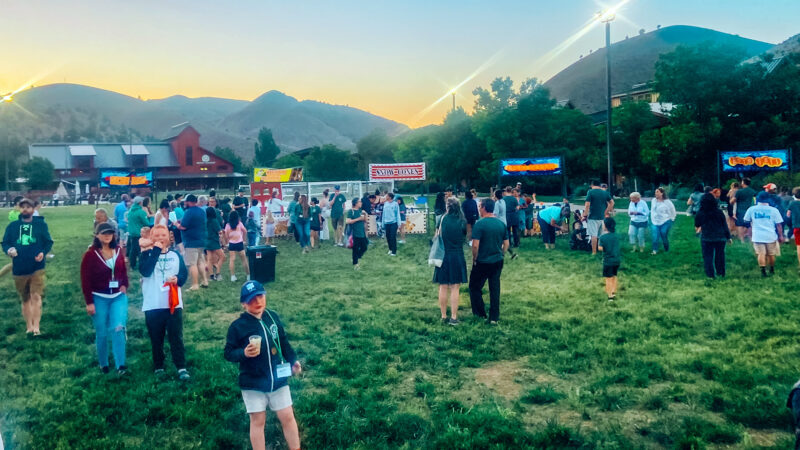Campfires and Connections: How Summer Camp Brings Families with PKU Together
September 11, 2025
During the first five years of his life, Elijah – a 12-year-old boy from California living with phenylketonuria (PKU) – and his parents had rarely connected with families impacted by the rare genetic condition. That changed when the family attended flok Family Camp West for the first time in 2018.
“Our first time coming here was really good for Elijah,” recalls his dad, J.R. “He could see that he’s not the only one – there’s other people out there that have PKU.”
Elijah is one of two campers who shared their stories this year during the annual camp hosted by flok, a nonprofit organization focused on rallying the inherited metabolic disorder community to improve care. The organization holds Family Camps each year in Oregon and New Hampshire that bring together hundreds of people living with rare metabolic conditions such as PKU, which prevents the body from breaking down a specific amino acid found in all foods with protein.
Attendees at flok Family Camp enjoy a number of traditional camp activities, such as arts and crafts, swimming, water slides and a talent show, as well as educational sessions where attendees learn about the latest updates in metabolic science and care. The key focus, though, is creating a sense of community.
“Oftentimes people can feel really alone and isolated, and they might not know somebody in their community, their school, their work environment that has PKU,” says Kristen Vanags, flok’s Director of Community Engagement. “We come together to really build a community and build connection and support for one another.”
Maddy, a 12-year-old girl from Oregon who lives with PKU, first felt the power of connection to others with the condition when she attended camp in 2024 with her grandmother. Her parents, Ariel and Ben, were excited to join Maddy this year and see their daughter among a community where living with a rare metabolic condition is the norm.
“She’s not the kid with PKU – she’s Maddy,” says Ben. “She’s got straight A’s, she does theater, she does sports, she has good friends. She does everything all the other kids can do.”
“One of the cool things about going to this camp is meeting new people that share a similar life experience and seeing how their life with PKU is.”
Elijah, 12-year-old living with PKU
Campers Coming of Age
The teenage years are a major transition, made even more complex for people with PKU, whose daily routines require significant planning and coordination. People living with PKU generally need to limit their protein intake in order to avoid serious health consequences, including neurocognitive issues and impacts on quality of life – something parents say is particularly important as children begin making more of their own dietary decisions.
“When he was younger, I think it was easier to manage because you can literally pack a lunch box and then see what he did not eat, and then do the math in your head, and you knew exactly where he was at,” says Elijah’s mom, Candace. “Now that he’s getting older, he’s reaching an age where he’s going to have to make choices.”
Standing out at a time when most people are focused on fitting in can be a struggle, but camp provides an opportunity for young people to see they are not alone and learn from peers who are also working toward greater independence.
“One of the cool things about going to this camp is meeting new people that share a similar life experience and seeing how their life with PKU is,” says Elijah, who is entering middle school and pursuing interests in basketball, math and photography. “I think I have become more responsible in a lot of ways, from taking my medicine by myself and understanding what I can and can’t have in my daily life.”
“The idea of freedom from my PKU is really exciting. Especially if it helps me out so I don’t have to worry as much and be on as tight of a diet, because sometimes it’s hard.”
Maddy, 12-year-old living with PKU
Hopes for the Future
Maddy’s and Elijah’s families are both hopeful that scientific progress will continue to make it possible for more people with PKU to consume a less restricted diet and reduce reliance on synthetic medical foods and formula.
“There has been a lot of anxiety and a lot of tears stemming from PKU,” says Ariel. “To have that freedom and that weight off of her, I just can’t imagine what she would do.”
Maddy, who drinks formula two to three times a day and works hard to maintain a low-protein diet, also looks forward to the day when PKU fades more into the background of her everyday life.
“The idea of freedom from my PKU is really exciting,” says Maddy, a gifted musician and actor who aspires to perform on Broadway one day. “Especially if it helps me out so I don’t have to worry as much and be on as tight of a diet, because sometimes it’s hard.”
Candace, Elijah’s mom, is optimistic that work being done by flok, other advocates and the scientific community will continue to ensure a brighter future for her son and others living with PKU.
“There are so many people that are behind the scenes doing the footwork to help this community of people,” says Candace. “I just hope that he knows that the sky’s the limit in life for him.”


